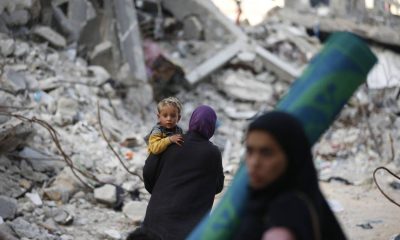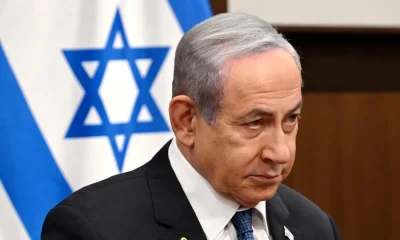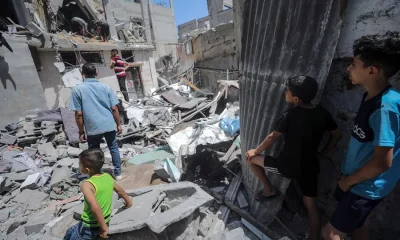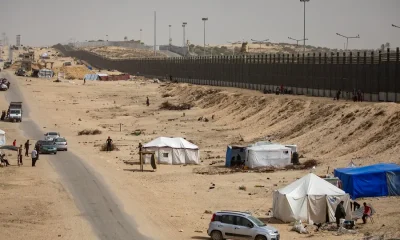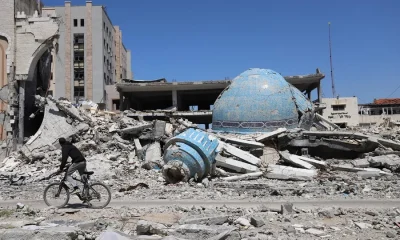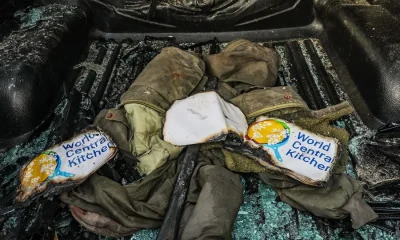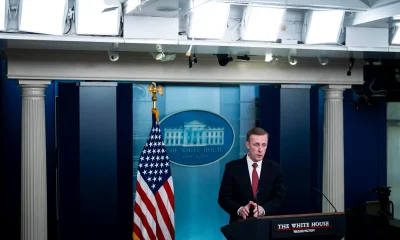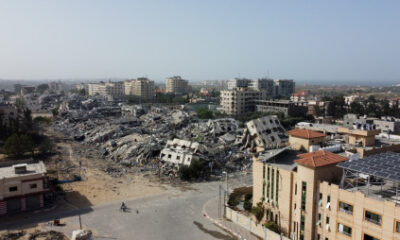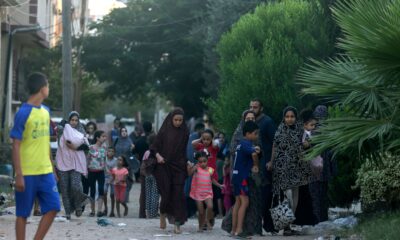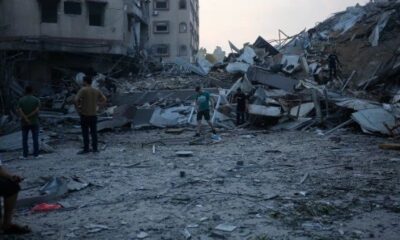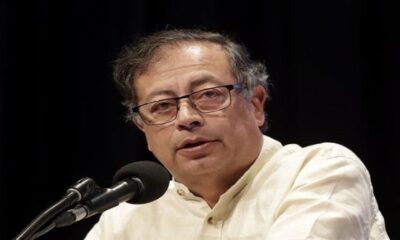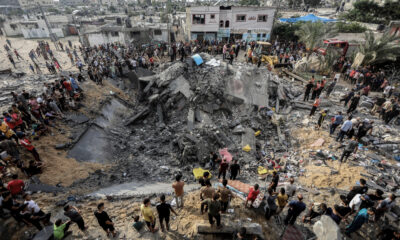International
Hamas rejects the Israeli proposal for a truce and demands a “comprehensivel” ceasefire and the withdrawal of troops
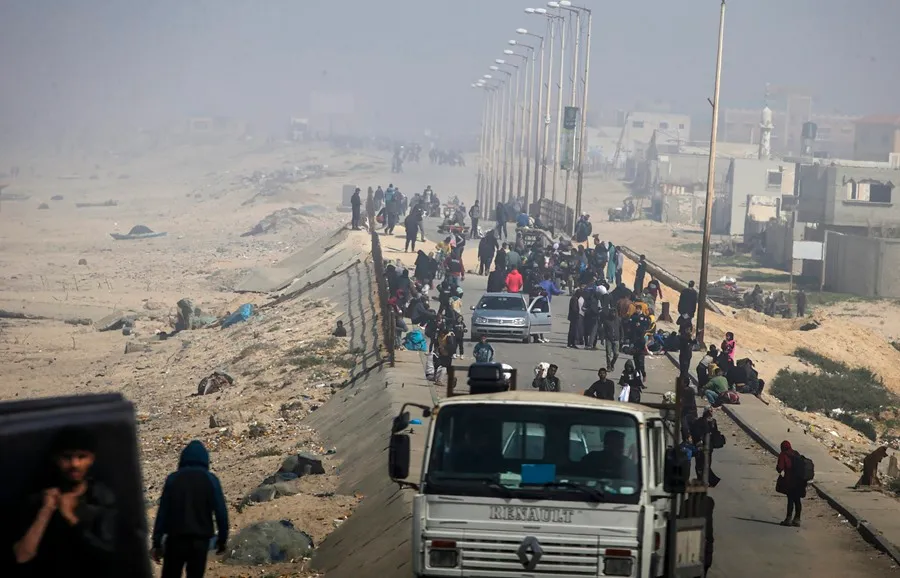
The Palestinian Islamist group Hamas has once again imposed as conditions for sealing a new truce agreement a “comprehensive” ceasefire and the withdrawal of Israeli troops from the Gaza Strip.
“The Hamas movement informed the mediating brothers that we adhere to our position and vision already presented on March 14, because the occupation did not respond to any of the basic demands of our people and our resistance,” the group reported in a statement.
Hamas cited “a comprehensive ceasefire, the withdrawal of the Gaza Strip, the return of the displaced and a real exchange of prisoners,” as its fundamental requirements.
Delegations of Israel and Hamas held indirect negotiations over the weekend in Doha – with the mediation of Qatar, Egypt and the United States – to achieve a new truce agreement, in which the Israeli delegation, headed by the head of the Mosad, David Barnea, proposed a new proposal, to which the Islamist group had to respond in the coming days.
In today’s statement, Hamas reiterates that “Netanyahu and his extremist government have all the responsibility to thwart negotiation efforts and hinder the achievement of an agreement so far.”
Israel called the demands of the Islamist group Hamas “delusional” on Tuesday and warned that “it will not submit to its demands.”
“The position of Hamas clearly shows that it is not interested in continuing negotiations to reach an agreement, and it is an unfortunate testimony of the damage of the Security Council’s decision,” said a statement from the Prime Minister’s Office.
Faced with this situation, Prime Minister Benjamin Netanyahu called on his negotiating team in Doha to return to Israel.
The proposal rejected by Hamas would contemplate the release of about 700 or 800 Palestinian prisoners, including a hundred convicted of murder, in exchange for the release of about 40 hostages, primarily women, children, the sick and the elderly in a first phase, according to leaks to the Hebrew press.
The new draft doubled the number of Palestinian prisoners that Israel would be willing to release, since weeks ago it was negotiated on a basis of 400 prisoners for 40 hostages, during a six-week truce.
A critical point in the negotiations is the profile of Palestinian prisoners to be released: Hamas demands about 30 prisoners sentenced to life imprisonment for terrorism, for every female soldier he delivers. Israel’s counter-offer is five of these prisoners for each female soldier.
On the ground, the situation is becoming more dramatic every day. At least 18 Palestinians have died in the north of the Strip in the last few hours, when dozens of “hungry” people entered the sea to collect the humanitarian aid packages launched from the air.
Twelve of them have drowned and six suffocated from the stampede, according to the Ministry of Health of the enclave controlled by Hamas.
It is not the first time that the launch of air packages has claimed the lives of civilians from Gaza.
Faced with this situation, the Palestinian authorities have called for an end to this type of “useless, offensive and inappropriate” operations and asked Israel to open “immediately” the rest of the land border crossings – there are five unopened – to alleviate the “serious” food shortages suffered by civilians in northern Gaza for the sixth consecutive month.
Meanwhile, the Israeli Army assured on Tuesday that in the last few hours they have attacked more than 60 “terrorist targets” in the Gaza Strip.
“Combat planes attacked more than 60 terrorist targets in the Gaza Strip, including terrorist tunnels and military infrastructures in which armed terrorists were identified,” they explain in a military statement.
Israeli troops also attacked the area from which on Monday several projectiles were fired towards the Israeli city of Sderot, the closest to the enclave, and also on the city of Ashdod, where for the first time in two months rockets from Hamas arrived, most of them intercepted by the Israeli anti-aircraft defense.
In addition, the Al Shifa hospital is still besieged, more than a week after Israeli troops occupied it for the fourth time since the beginning of the offensive in the Strip, on October 7.
On Monday, the spokesman for the Israeli Army, Daniel Hagari, assured that the operation inside the largest hospital in the Strip is “being one of the most successful” of this war because in just one week they have managed to kill more than 170 alleged militiamen from Hamas and Islamic Jihad, avoiding “damage to patients, civilians and medical equipment.”
However, the Ministry of Health of Gaza, controlled by Hamas, denounced that at least 18 patients in this hospital have died in recent days after the incursion of Israeli troops.
For its part, the Palestinian Red Crescent (MLRP) denounced tonight that Jan Yunis’ Al Amal hospital is already out of service as a result of the siege carried out last Sunday by the Israeli Army, when it forced the evacuation of health personnel and the injured.
According to the organization, they also evacuated the bodies of two people who died during the siege, a civilian who was taking refuge in the hospital and a volunteer of the MLRP, a member of the emergency team.
The Hebrew troops justified their assault on this medical center under the same thesis that they maintain in the Shifa: the presence of alleged “terrorists” in these hospital centers.
International
Dominican ‘False Hero’ Arrested for Faking Role in Nightclub Collapse That Killed 231

A man identified as Rafael Rosario Mota falsely claimed to have rescued 12 people from the collapse of the Jet Set nightclub in Santo Domingo—a tragedy that left 231 people dead—but he was never at the scene.
Intelligence agents in the Dominican Republic arrested the 32-year-old man for pretending to be a hero who saved lives during the catastrophic incident, authorities announced.
Rosario Mota had been charging for media interviews in which he falsely claimed to have pulled survivors from the rubble after the nightclub’s roof collapsed in the early hours of April 8, during a concert by merengue singer Rubby Pérez, who was among those killed.
“He was never at the scene of the tragedy,” the police stated. The arrest took place just after he finished another interview on a digital platform, where he repeated his fabricated story in exchange for money as part of a “media tour” filled with manipulated information and invented testimonies.
“False hero!” read a message shared on the police force’s Instagram account alongside a short video of the suspect, in which he apologized: “I did it because I was paid. I ask forgiveness from the public and the authorities.”
Central America
Nicaraguan Exiles to Mark 7th Anniversary of 2018 Protests with Global Commemorations

The Nicaraguan opposition in exile announced on Thursday that it will commemorate the seventh anniversary of the April 2018 protests against the government of President Daniel Ortega and his wife, Rosario Murillo, with events in Costa Rica, the United States, and several European countries.
The commemorative activities—which will call for justice for the victims, as well as freedom and democracy for Nicaragua—will include religious services, public forums, cultural fairs, and other public gatherings, according to official announcements.
In April 2018, thousands of Nicaraguans took to the streets to protest controversial reforms to the social security system. The government’s violent response quickly turned the demonstrations into a broader call for the resignation of President Ortega, who is now 79 and has been in power since 2007.
The protests resulted in at least 355 deaths, according to the Inter-American Commission on Human Rights (IACHR), although Nicaraguan organizations claim the toll is as high as 684. Ortega has acknowledged “more than 300” deaths and maintains the unrest was an attempted coup d’état.
International
Arsenal stun Real Madrid at the Bernabéu to reach Champions League semifinals

Arsenal enjoyed a “historic night” on Wednesday after defeating Real Madrid 2-1 at the Santiago Bernabéu, knocking them out of the Champions League quarterfinals, midfielder Declan Rice said.
“It’s such a special night for this club, a historic night for this club,” said Rice, who scored twice in the first leg in London, speaking to TNT Sports.
The English international was named Man of the Match in both legs — the 3-0 win in London and the second leg in Madrid.
“It’s amazing. I knew we were on an upward trajectory and we’ve done incredibly well in this competition. We deserve it and we have full confidence in our coach. Reaching the semifinals is unbelievable,” Rice added.
-

 Central America4 days ago
Central America4 days agoHonduran Police Offer $135K for Tips Leading to the Arrest of Romeo Vásquez
-

 Central America3 days ago
Central America3 days agoPetro questions Ecuador’s vote, cites reports of military control and arrests
-

 International4 days ago
International4 days agoMPV Denounces Electoral Blockade as Secretary-General is Disqualified for May Elections
-

 International2 days ago
International2 days agoArsenal stun Real Madrid at the Bernabéu to reach Champions League semifinals
-

 International4 days ago
International4 days agoMaduro Plans Major Workers’ March on May 1st to Defend Venezuela’s Freedom
-

 International2 days ago
International2 days agoBogotá residents line up for yellow fever vaccine amid national alert
-

 International2 days ago
International2 days agoMexico refuses to restore ties with Ecuador while Noboa remains in office
-

 International2 days ago
International2 days agoDeSantis’ immigration crackdown sparks alarm in Venezuelan Communities in Doral
-

 International18 hours ago
International18 hours agoDominican ‘False Hero’ Arrested for Faking Role in Nightclub Collapse That Killed 231
-

 Central America18 hours ago
Central America18 hours agoNicaraguan Exiles to Mark 7th Anniversary of 2018 Protests with Global Commemorations
-

 International3 days ago
International3 days agoColombia: Search continues for missing limb of italian scientist found dismembered














